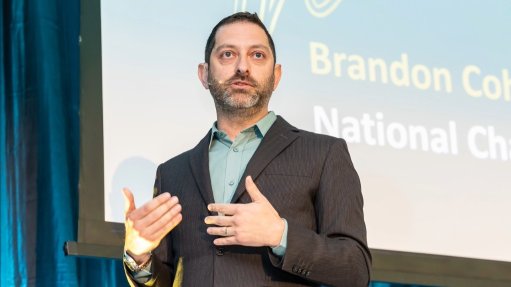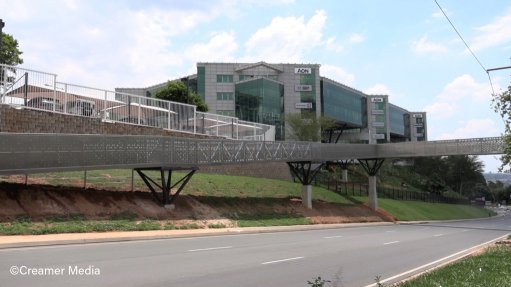Opinion: Procurement laws are a transformational tool that must be used correctly
In this article, Wilson Bayly Holmes-Ovcon (WBHO) CEO Wolfgang Neff writes that the Public Procurement Bill, currently before the National Council of Provinces (NCOP), could have negative consequences, especially for the country's construction sector.
The Public Procurement Bill is making its way through the NCOP after having been passed by the National Assembly in December last year. In the past weeks, we have seen provincial public hearings on the Public Procurement Bill, as well as public hearings before the Select Committee on Finance in Parliament.
This is a consequential Bill with far-reaching implications. It aims, among other things, to regulate public procurement and to prescribe a framework within which preferential procurement must be implemented going forward. Public procurement makes up a substantial part of the government's entire annual spend. The Public Procurement Bill, once enacted, will in effect regulate how almost a trillion rand will be spent annually by government, amounting to just over one-fifth of South Africa's gross domestic product.
Industry associations such as the Public Procurement Working Group (which includes the Ahmed Kathrada Foundation and Corruption Watch), Consulting Engineers South Africa as well as Master Builders South Africa have expressed concern about the Bill. Many other stakeholders, including various civil society organisations, have made submissions and voiced their deep unease about the current Gazetted version of the Public Procurement Bill.
Outside of the formal public hearings process, it is therefore surprising that the Public Procurement Bill has not received more mainstream media attention.
Two main goals of the Public Procurement Bill are inarguably well-intentioned: fighting corruption in State spending is essential, as is the need for a structured approach in ensuring sustainable transformation and empowerment in the economy. But, unfortunately, the manner in which the Public Procurement Bill seeks to achieve these two goals is deeply flawed and would have contrary, unintended consequences to the detriment of the taxpayers, citizens and sustainable transformation as a whole.
As has been reported in the media, the South African National Roads Agency intends having R28-billion worth of tenders in the market by the end of March. Finance Minister Enoch Godongwana has indicated government’s intention to prioritise infrastructure spending, with plans to invest more than R943-billion in public infrastructure, supporting the repair and maintenance of existing assets and the construction of new infrastructure. The construction sector is a prime example of the transformational power State spending can have while serving as a key driver of economic growth.
In large part due to already existing preferential procurement and broad-based black economic empowerment measures, the construction sector has been steadily transforming for years. The construction sector has a remarkable transformation story to tell.
In the case of WBHO, it continues to be a priority for us to make sure that, as one of the country’s largest construction companies, we reflect and are representative of the country we build in and for. To achieve these goals WBHO’s broad-based employee share schemes and trusts adhere to the scorecard elements in the 2017 Amended Construction Codes.
WBHO’s own preferential procurement spend, which focuses on contractual spend on black suppliers and subcontractors, was R7.2-billion in the last financial year alone. WBHO, having witnessed the practical benefits that have accrued to black suppliers and subcontractors through preferential procurement as a transformational tool, wishes to see it deployed in a manner that is fair, equitable, transparent, cost-effective and competitive.
What is of particular concern is that the current version of the Public Procurement Bill appears not to incorporate valuable stakeholder input on important provisions such as the undue and unchecked power it grants to the Minister of Finance, the fact that it will impede municipalities, provinces and public entities from determining their own procurement criteria, the sufficiency of the Public Procurement Bill’s consultation process, and whether the extent of the material amendments to the current version of the Bill do not warrant the National Assembly reviewing it before final approval. It is the general consensus that the current version before the NCOP, if enacted into law, will unfortunately only invite legal challenges.
Well-considered and supported procurement legislation can make a massive contribution to economic growth and transformation. Such legislation should aim to promote economic growth and job creation in a way that empowers individuals and communities, as well as continuing to support and bolster the strides that have been made in transforming sectors such as the construction industry.
Article Enquiry
Email Article
Save Article
Feedback
To advertise email advertising@creamermedia.co.za or click here
Comments
Press Office
Announcements
What's On
Subscribe to improve your user experience...
Option 1 (equivalent of R125 a month):
Receive a weekly copy of Creamer Media's Engineering News & Mining Weekly magazine
(print copy for those in South Africa and e-magazine for those outside of South Africa)
Receive daily email newsletters
Access to full search results
Access archive of magazine back copies
Access to Projects in Progress
Access to ONE Research Report of your choice in PDF format
Option 2 (equivalent of R375 a month):
All benefits from Option 1
PLUS
Access to Creamer Media's Research Channel Africa for ALL Research Reports, in PDF format, on various industrial and mining sectors
including Electricity; Water; Energy Transition; Hydrogen; Roads, Rail and Ports; Coal; Gold; Platinum; Battery Metals; etc.
Already a subscriber?
Forgotten your password?
Receive weekly copy of Creamer Media's Engineering News & Mining Weekly magazine (print copy for those in South Africa and e-magazine for those outside of South Africa)
➕
Recieve daily email newsletters
➕
Access to full search results
➕
Access archive of magazine back copies
➕
Access to Projects in Progress
➕
Access to ONE Research Report of your choice in PDF format
RESEARCH CHANNEL AFRICA
R4500 (equivalent of R375 a month)
SUBSCRIBEAll benefits from Option 1
➕
Access to Creamer Media's Research Channel Africa for ALL Research Reports on various industrial and mining sectors, in PDF format, including on:
Electricity
➕
Water
➕
Energy Transition
➕
Hydrogen
➕
Roads, Rail and Ports
➕
Coal
➕
Gold
➕
Platinum
➕
Battery Metals
➕
etc.
Receive all benefits from Option 1 or Option 2 delivered to numerous people at your company
➕
Multiple User names and Passwords for simultaneous log-ins
➕
Intranet integration access to all in your organisation

















